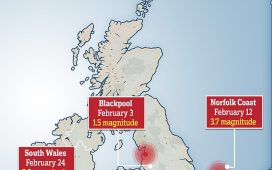[ad_1]
Scientists are appealing for calm following suggestions that Covid vaccines might not protect people against a new variant of the virus that has emerged in South Africa.
Experts say there is no need for panic, even though the health secretary, Matt Hancock, has said he is very concerned about the latest variant of Sars-Cov-2, which has emerged in South Africa and is said to be highly transmissible, as is the variant first seen in Kent.
There have already been a few cases of infection with the South African strain in the UK.
“I’m incredibly worried about the South African variant,” said Hancock on BBC Radio 4’s Today programme. “That’s why we took the action that we did to restrict all flights from South Africa, and movement from South Africa, and to insist that anybody who’s been to South Africa self-isolates. This is a very, very significant problem.”
Hancock voiced his concern following an interview on Times Radio at the weekend with Sir John Bell, the government’s life sciences champion and a key figure behind the Oxford/AstraZeneca vaccine, which has just begun to be used by the NHS.
Bell said he had no worries about the efficacy of the vaccine against the variant that emerged in Kent and was spreading rapidly across the UK. But, he said: “I don’t know about the South African strain. There is a big question mark over that.”
Teams at Oxford were looking at both variants to assess whether the vaccine would protect against them.
“The real question is whether the vaccines are going to be adequate,” said Bell. They worked much better than it was assumed they would work in preventing disease, so it was unlikely any mutations in the virus would turn off a vaccine entirely, but viruses adapted to survive.
“We’re now in a game of cat and mouse, because these are not the only two variants we are going to see,” he said.
Experts say mutations of the virus are to be expected, but that it is likely the vaccines will still work to prevent people infected with variants from becoming severely ill. However, they are watching developments in South Africa closely.
“Viruses mutate and new strains will emerge,” said Prof James Naismith, the director of the Rosalind Franklin Institute. “The so-called South African strain has a number of changes, and scientists are working flat out to understand their significance. Some of the changes are quite significant and thus scientists are paying a lot of attention. We do not yet know enough to say more than this.”
Ravi Gupta, a professor of clinical microbiology at Cambridge University and an honorary professor at the University of KwaZulu-Natal in South Africa, has been working on how mutations to the virus are increasing infectivity. There was a need to strike a balance, he said, “between warning people about something that might be important and creating panic, which I think is what is happening”.
Surveillance and control measures needed to be stepped up, he said, and the variant from South Africa, like the variant from Kent, probably had already spread to many countries that did not have the sort of comprehensive genetic sequencing available in the UK and South Africa. But nobody should yet assume the vaccines would be compromised, he said.
“Vaccines are really vital in this fight. We need to get them out as quickly as we can. We think they are still going to be effective,” he said.
Naismith said a climate of fear would help nobody. “For the general public, I would say think about our human nature. Many of us like a good scare and horror stories are part and parcel of human culture, which means such things get a lot of coverage. However, a drumbeat of nightmare scenarios about this new variant does nothing but create anxiety because too little is known and there is nothing we can do about it at the moment,” he said.
[ad_2]
READ SOURCE





